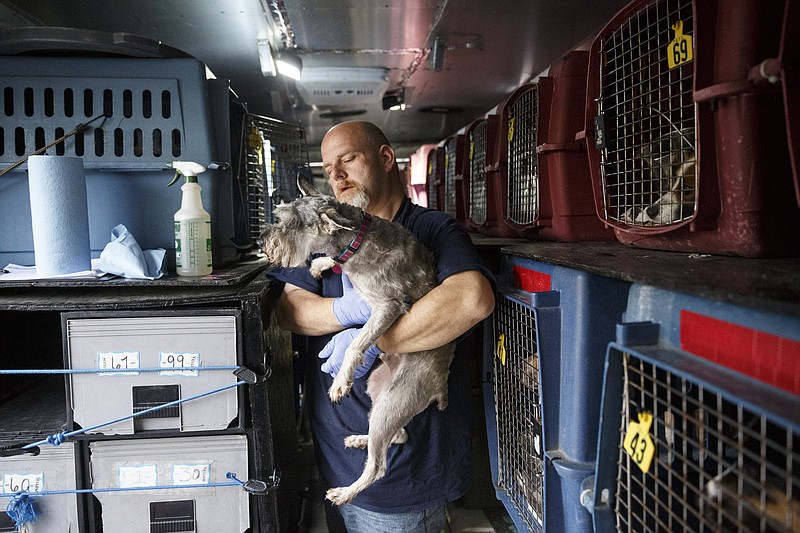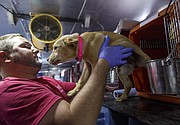The young Labrador retriever doesn't want to get out of Debbie Ginn's car, parked in the rear of the MAPCO truck stop on Rossville Boulevard just a few blocks south of Interstate 24.
The roar of the diesel engines is frightening as the big trucks pull around to the fuel pumps.
And so is the medley of barks, howls, yelps and woofs coming from the brightly painted P.E.T.S. truck parked nearby.
Ginn found the dog three months ago during the Christmas holidays, wandering around with his mother in Marion County. Even now, after weeks of regular meals, he is too thin, and he has the skittishness of a dog that has been mistreated.
But Ginn manages to tug on his leash enough to get him into the arms of Jason Gentry, and the four-year P.E.T.S. veteran loads him into a crate among the 50-odd other lucky former strays on the truck who are leaving the Southeast on this Thursday afternoon for a better life up North.
This is a weekly stop for P.E.T.S., a Cookeville- based dog transport firm started 12 years ago by Kyle Peterson, his wife, Pam, and her father-in-law to move abandoned dogs from overcrowded shelters in the Southeast to waiting homes in the Northeast.
Initially, Kyle Peterson said he and his wife drove pets from Tennessee to adoptive homes as volunteers. Often the dogs would travel a few dozen miles at a stretch, taking several days and passing through many foster homes before reaching their destination.
But in 2004, Kyle was between jobs, he said, and local animal rescue groups had a dozen or so dogs that needed transportation to New England, so he volunteered to drive them all the way.
When he got back, there was another bunch of dogs waiting, and then another.
"Once we started going regularly, the floodgate opened," he said. "From that moment, it became a business."
The 50-dog truck in Rossville began the day in Mobile, Ala., and wound its way up through Memphis and over to Nashville, picking up dogs along the way before arriving in Rossville, driver Michael Bailey said. Bailey and Gentry will stop for the night at the Petersons headquarters in Cookeville. There they will hook up with P.E.T.S.' other main vehicle, which can carry 150 dogs, before heading north on Interstate 81.
Each year, P.E.T.S. moves some 6,000 dogs north, Kyle Peterson said - more than 63,000 since 2004.
The Petersons are not alone.
Over the past 10 years, animal rescue activists, animal shelters, the American Society for the Prevention of Cruelty to Animals and PetSmart have created a loose-knit network stretching from Texas to Florida in the Southeast and all the way from Michigan to Maine in the North, to move tens of thousands of unwanted dogs from overcrowded "kill" shelters in the South into welcoming homes in the Northeast.
Chattanooga's two main animal shelters, McKamey Animal Center and the Humane Educational Society, both use GoNorth, based in Knoxville, and PetSmart's Rescue Waggin'.
In a typical year, McKamey sends between 800 and 900 dogs north, Executive Director Jamie McAloon said, enough that the shelter has not had to euthanize any dogs for lack of space since at least 2012. (Some dogs also head down to Atlanta, she said).
HES sent 322 dogs Northeast in 2013, the first year they began sending dogs out of state, but the number climbed to 636 by last year and is on track to reach 800 this year, Executive Director Bob Citrullo said.
***
The initial push to move pets from one part of the country to another came when Hurricane Katrina struck New Orleans in 2005, according to Jodi Buckman, senior director of community outreach for the ASPCA. Animal rescuers had to move thousands of pets out of New Orleans, and in doing so, often formed friendships with like-minded folks in other parts of the country.
Once that crisis was over, some of those people realized they had stumbled on a way to rescue thousands of pets. Overcrowded shelters in the Southeast put to death as many as 80 percent of their animals every year, according to Teresa Fisher, an expert on animal shelters and program director for the Companion Animal Initiative of Tennessee at the University of Tennessee's veterinary school in Knoxville.
While some larger Southeastern shelters such as McKamey and HES have forged ties with specific shelters in the Northeast, many dogs in smaller, rural shelters are saved by dozens of small-scale animal rescue groups, often little more than a handful of friends in states a thousand miles apart.
When she is not out rescuing Labradors from Marion County, Debbie Ginn runs Mutts4Rescue, picking dogs from area shelters to send via P.E.T.S. to small rescue groups in Connecticut.
Her friend Melissa Adams, who joined her in Rossville on a recent Thursday, works with Emily's Friends, which she describes as five or six friends in Connecticut who hooked up with Melissa and her friends here.
So why do folks in Connecticut and New York and Ohio love Southern dogs more than Southerners do?
Because Southern dog and cat owners are less willing to have their pets spayed or neutered, according to UT's Fisher.
"I wouldn't say people don't care, it's just that people don't know," she said. "You do it this way because grandpa did it this way. They have never been exposed to a different way of doing things."
In the Northeast, most towns require pets to be spayed or neutered. Bitter cold winters mean dogs must be kept indoors and kill off sick and very young strays. As a result, many shelters have a shortage of adoptable dogs, particularly smaller dogs that fit into smaller houses or apartments.
In the South, "we have animals breeding all year long," Fisher said.
And dogs are fertile. A typical female dog will give birth to two litters of eight puppies each in a year. If none of those offspring are neutered, they could produce 128 in just one year, and 2,000 more dogs in only four years.
But only 62 of Tennessee's 95 counties even have animal shelters, Fisher said, and six counties don't even have a veterinarian, let alone an affordable place to get a pet spayed or neutered.
"If you are on a fixed income, you may not be able to afford to travel out of your county [to find a vet]," Fisher said. "When we have no animal control and no shelter, animals are left to run at large and breed."
Until something is done to change that, all of the dog trucks headed North will be in vain, she said.
"Would more transport help? Yes," she said. "But we have to turn the faucet off. If we just transport and don't turn off the faucet, we're not fixing the problem."
Contact staff writer Steve Johnson at sjohnson@timesfreepress.com, 423-757-6673, on Twitter @stevejohnsonTFP or on Facebook, www.facebook.com/noogahealth.

